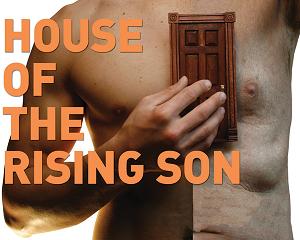
THE TALENTED MR. JACOBSON
Tom Jacobson is nothing if not ambitious. He is not only the most prolific Los Angeles playwright of the moment, but he is the one, given the astonishing record of his successes, on whom one is counting to stay the course and win national recognition – which has eluded some of our best home-grown talents like John Steppling, Justin Tanner, Michael Sargent, and Del Shores, to name just a few – and which might finally put Los Angeles on the theater map. And, in an auspicious moment, the exciting new theater complex, Atwater Village Theatre, is playing host to two new Jacobson plays, creating an intermission stir that any playwright might envy. On one stage,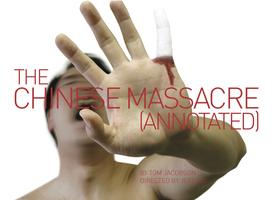 Ensemble Studio Theatre-Los Angeles is presenting House of the Rising Son and, next door, Circle X Theatre Co. is giving us the opportunity to see The Chinese Massacre (Annotated). The plays couldn’t be more different and the results are not equally happy, but this qualifies as an authentic event.
Ensemble Studio Theatre-Los Angeles is presenting House of the Rising Son and, next door, Circle X Theatre Co. is giving us the opportunity to see The Chinese Massacre (Annotated). The plays couldn’t be more different and the results are not equally happy, but this qualifies as an authentic event.
House of the Rising Son is, to this reviewer, the more thrilling and theatrically complex play – a fitting extension to the excitement created by last season’s The Twentieth Century Way – and I will get to it in time, but, first. let me talk a bit about The Chinese Massacre (Annotated).
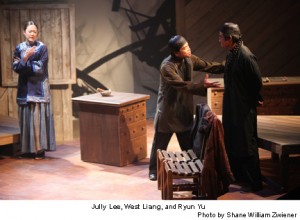 Nothing has been spared in its attempt to give the play every chance to be taken seriously: Sibyl Wickersheimer’s all-wood set has the plainness of the best poetry and Dianne K. Graebner’s costumes – and the actors donning them – achieve the archetypal look of the period lavishly and, simultaneously, simply. In just the way it looks, it is certainly the smartest and perhaps the most beautiful production in town. It takes the text at hand very seriously and artfully. And what Jacobson is trying here is to investigate the horrors of the first race riot in a Los Angeles which resembles not the Los Angeles we know but rather a Los Angeles indistinguishable from the wild west towns of history and, for a contemporary audience, of the movies. He writes in a style meant to evoke Bertolt Brecht’s Epic Theater and, at the same time, to slyly spoof the Brechtian technique. So sly, in fact, that it even alienates itself from the jolt of political shock that, at his most didactic, Brecht could always convey. And so the story he tells is posed in exquisite living tableaux which, when frozen, are like daguerreotypes and paintings of the past brought startlingly to life. It is like watching history pass before our eyes, under glass, in a museum exhibit. We see this; we move on to that.
Nothing has been spared in its attempt to give the play every chance to be taken seriously: Sibyl Wickersheimer’s all-wood set has the plainness of the best poetry and Dianne K. Graebner’s costumes – and the actors donning them – achieve the archetypal look of the period lavishly and, simultaneously, simply. In just the way it looks, it is certainly the smartest and perhaps the most beautiful production in town. It takes the text at hand very seriously and artfully. And what Jacobson is trying here is to investigate the horrors of the first race riot in a Los Angeles which resembles not the Los Angeles we know but rather a Los Angeles indistinguishable from the wild west towns of history and, for a contemporary audience, of the movies. He writes in a style meant to evoke Bertolt Brecht’s Epic Theater and, at the same time, to slyly spoof the Brechtian technique. So sly, in fact, that it even alienates itself from the jolt of political shock that, at his most didactic, Brecht could always convey. And so the story he tells is posed in exquisite living tableaux which, when frozen, are like daguerreotypes and paintings of the past brought startlingly to life. It is like watching history pass before our eyes, under glass, in a museum exhibit. We see this; we move on to that.
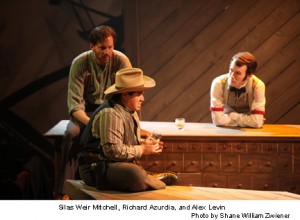 But The Chinese Massacre (Annotated) stubbornly refuses to get beyond its imagery; it has none of the breath of life that would propel forward movement in any strong or positive way. This is history as still life. The drama, such as it is, revolves around a “chinkie pinkie,” which is how a character’s mutilated finger is described, and how it, as an artifact of the historical moment, gains importance. The play also means to demonstrate the intricate nature of prejudice and one of its interesting points is that the Jewish community joins in the rage against the Chinese immigrants whose ancient mythologies remain intact; the problem here is that the actors infuse these parts with such abominable Jewish accents that it clearly marks the inscrutable but intellectually stoic Chinese as being nobler than the more assimilative Jews. The play’s final image is, to be sure, stunning both as theater and as a reminder that history is never really forgotten, but it is also the exact image we might have predicted from the moment the lights go up, and does provoke one to wonder if it was necessary to go through the Chinese torture which director Jeff Liu definitely puts us through to get there.
But The Chinese Massacre (Annotated) stubbornly refuses to get beyond its imagery; it has none of the breath of life that would propel forward movement in any strong or positive way. This is history as still life. The drama, such as it is, revolves around a “chinkie pinkie,” which is how a character’s mutilated finger is described, and how it, as an artifact of the historical moment, gains importance. The play also means to demonstrate the intricate nature of prejudice and one of its interesting points is that the Jewish community joins in the rage against the Chinese immigrants whose ancient mythologies remain intact; the problem here is that the actors infuse these parts with such abominable Jewish accents that it clearly marks the inscrutable but intellectually stoic Chinese as being nobler than the more assimilative Jews. The play’s final image is, to be sure, stunning both as theater and as a reminder that history is never really forgotten, but it is also the exact image we might have predicted from the moment the lights go up, and does provoke one to wonder if it was necessary to go through the Chinese torture which director Jeff Liu definitely puts us through to get there.
But Jacobson’s concern with history is a valid one and, in a sense, his invention of history in House of the Rising Son is infinitely more satisfying than his reproduction of history in Massacre.
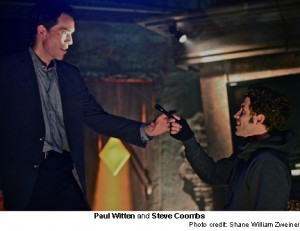 Not that House is in any way an easier play to sit through; it’s just that its rewards are greater. In this play, the ride Jacobson takes us on is not only more arduous and hazardous, but, it proves to be, finally, a ride well worth taking. It would be patently unfair to tell the reader too much of what happens because part of the fun of this endlessly fascinating work is watching it unfold and being involved in the twists and turns that Jacobson takes in telling the saga of a gay dynasty. The evolution of the play from a lecture by a young scientist on the virtue of parasites which proves sexually arousing to a young member of his audience to its final unexpected bedroom foursome is dizzying and rich with possibilities. If not all of these possibilities contain what might be considered external logic, there is no denying, as the pieces come together, that there is always an internal logic to Jacobson’s bountifully brilliant plan, which is mind-bending.
Not that House is in any way an easier play to sit through; it’s just that its rewards are greater. In this play, the ride Jacobson takes us on is not only more arduous and hazardous, but, it proves to be, finally, a ride well worth taking. It would be patently unfair to tell the reader too much of what happens because part of the fun of this endlessly fascinating work is watching it unfold and being involved in the twists and turns that Jacobson takes in telling the saga of a gay dynasty. The evolution of the play from a lecture by a young scientist on the virtue of parasites which proves sexually arousing to a young member of his audience to its final unexpected bedroom foursome is dizzying and rich with possibilities. If not all of these possibilities contain what might be considered external logic, there is no denying, as the pieces come together, that there is always an internal logic to Jacobson’s bountifully brilliant plan, which is mind-bending.
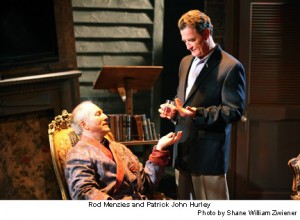 The work is sustained by the bracing intelligence of Jacobson’s writing but even more by the dazzling amount of ideas that Jacobson literally stuffs into his play; it could be argued that it is stuffed to overflowing and could be judiciously edited, but each and every idea is so interesting it would seem like sheer churlishness to insist upon eliminating a single one. But it is, I think, valid to suggest that Jacobson illuminate some of them a bit more coherently. But I dare anyone to not be intrigued by a play that tries to bring its drama to a boiling point by interconnecting such disparate themes as modern gay sensibility versus more traditional views, father and son crises, the nature of parasites on a real and metaphorical level, the virtues of Los Angeles, the excesses of New Orleans, haunted houses, graveyard encounters, visits to gay strip joints, tours of houses where Tennessee Williams may or may not have stepped foot, and the way the ghost of Williams himself haunts contemporary gay theater. Jacobson’s approach is sometimes more cerebral than warming, but, even so, though he avoids mawkishness, there is a sentimental side to the denouement, which is made oddly plausible. At any rate, House stretches the potential of gay theater even further than he did in The Twentieth Century Way. In some ways, a mere review cannot contain all of the elements of Jacobson’s concerns; it’s a good educated guess that this will all be discussed years from now as our view of gay history changes, and, at any rate, should be the source of provocative conversations long after one has left the theater.
The work is sustained by the bracing intelligence of Jacobson’s writing but even more by the dazzling amount of ideas that Jacobson literally stuffs into his play; it could be argued that it is stuffed to overflowing and could be judiciously edited, but each and every idea is so interesting it would seem like sheer churlishness to insist upon eliminating a single one. But it is, I think, valid to suggest that Jacobson illuminate some of them a bit more coherently. But I dare anyone to not be intrigued by a play that tries to bring its drama to a boiling point by interconnecting such disparate themes as modern gay sensibility versus more traditional views, father and son crises, the nature of parasites on a real and metaphorical level, the virtues of Los Angeles, the excesses of New Orleans, haunted houses, graveyard encounters, visits to gay strip joints, tours of houses where Tennessee Williams may or may not have stepped foot, and the way the ghost of Williams himself haunts contemporary gay theater. Jacobson’s approach is sometimes more cerebral than warming, but, even so, though he avoids mawkishness, there is a sentimental side to the denouement, which is made oddly plausible. At any rate, House stretches the potential of gay theater even further than he did in The Twentieth Century Way. In some ways, a mere review cannot contain all of the elements of Jacobson’s concerns; it’s a good educated guess that this will all be discussed years from now as our view of gay history changes, and, at any rate, should be the source of provocative conversations long after one has left the theater.
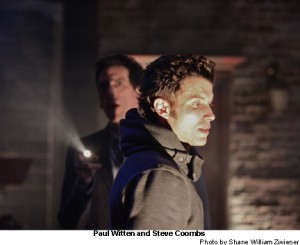 In Michael Michetti, Jacobson has found a strong and skillful interpreter of his theatrical imagination, even if Michetti is sometimes too reliant on actors who tend to spell things out when something subtler is required. But the actors work hard and instinctively and, though he seems to get younger and nimbler as the evening progresses, Rod Menzies also gets better and better as a crusty old grandfather, and the contrast between his performance and Steve Coombs’s quieter approach to the sensitive young gay interloper is, in the end, lovely to behold. Patrick John Hurley and Paul Witten complete the impressive ensemble.
In Michael Michetti, Jacobson has found a strong and skillful interpreter of his theatrical imagination, even if Michetti is sometimes too reliant on actors who tend to spell things out when something subtler is required. But the actors work hard and instinctively and, though he seems to get younger and nimbler as the evening progresses, Rod Menzies also gets better and better as a crusty old grandfather, and the contrast between his performance and Steve Coombs’s quieter approach to the sensitive young gay interloper is, in the end, lovely to behold. Patrick John Hurley and Paul Witten complete the impressive ensemble.
Richard Hoover’s set is meant to cover so much ground that it doesn’t always work, but it has a certain raffish waywardness that solves a good deal of the problem he has been given and is helped immensely by Jeremy Pivnick’s stunning lighting design and by the sounds of Bruno Louchouarn’s musical interludes and by the way his tonal emphasis can actually help the transitions the play makes, often without warning.
However you look at them, the new and exciting Atwater Village Theatre is providing, with these productions of the work of the prodigiously promising Tom Jacobson, truly adventurous theater. House of the Rising Son is, in this reviewer’s opinion, the greater adventure.
harveyperr @ stageandcinema.com
photos by Shane William Zwiener
House of the Rising Son
scheduled to close May 29 at time of publication
for tickets, visit http://www.ensemblestudiotheatrela.org/
The Chinese Massacre (Annotated)
scheduled to close May 22 at time of publication
for tickets, visit http://www.circlextheatre.org or call 323.644.1929
House of the Rising Son by Tom Jacobson at Atwater Village Theater
The Chinese Massacre (Annotated) by Tom Jacobson at The Circle X Theatre Company at Atwater Village Theatre in Atwater Village

{ 3 comments… read them below or add one }
I love your reviews. This makes me want to see both plays. Such insightful,
Intelligent analysis. This is ,I feel, very helpful to Jacobson.
I must work with Michetti .
Great reviews and yet one small quibble. In Massacre it was the German Jewish Merchant and his wife who spirit the young husband out of harm’s way explaining “we know a pogrom when we see one” and lend him a weapon when he insists on going to rescue his bride, the opposite of joining in. Cheers,
Sandra
ditto to the above. reading you i feel i’m missing something — nothing in new york city does that to me. we really lost something important when you switched to l.a.